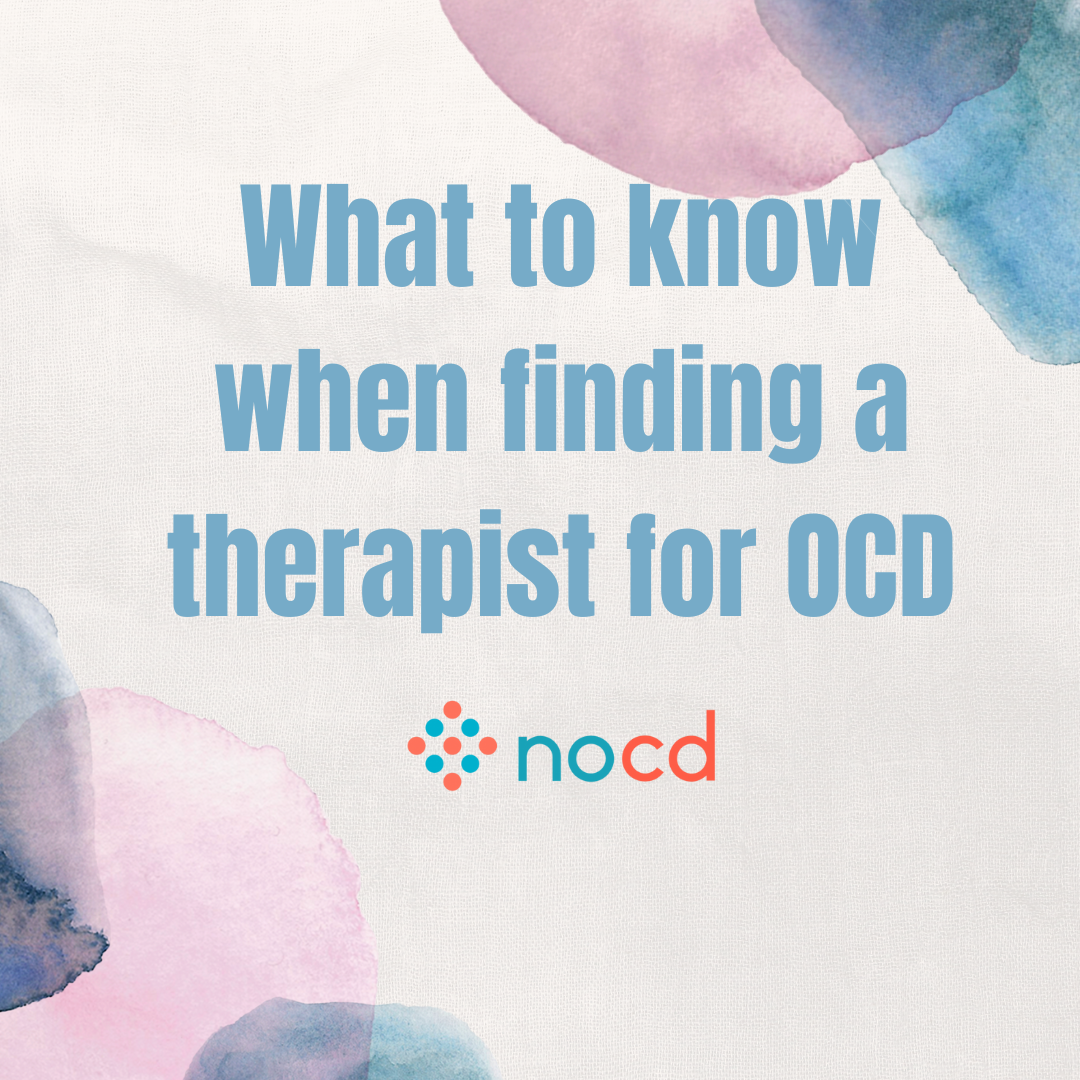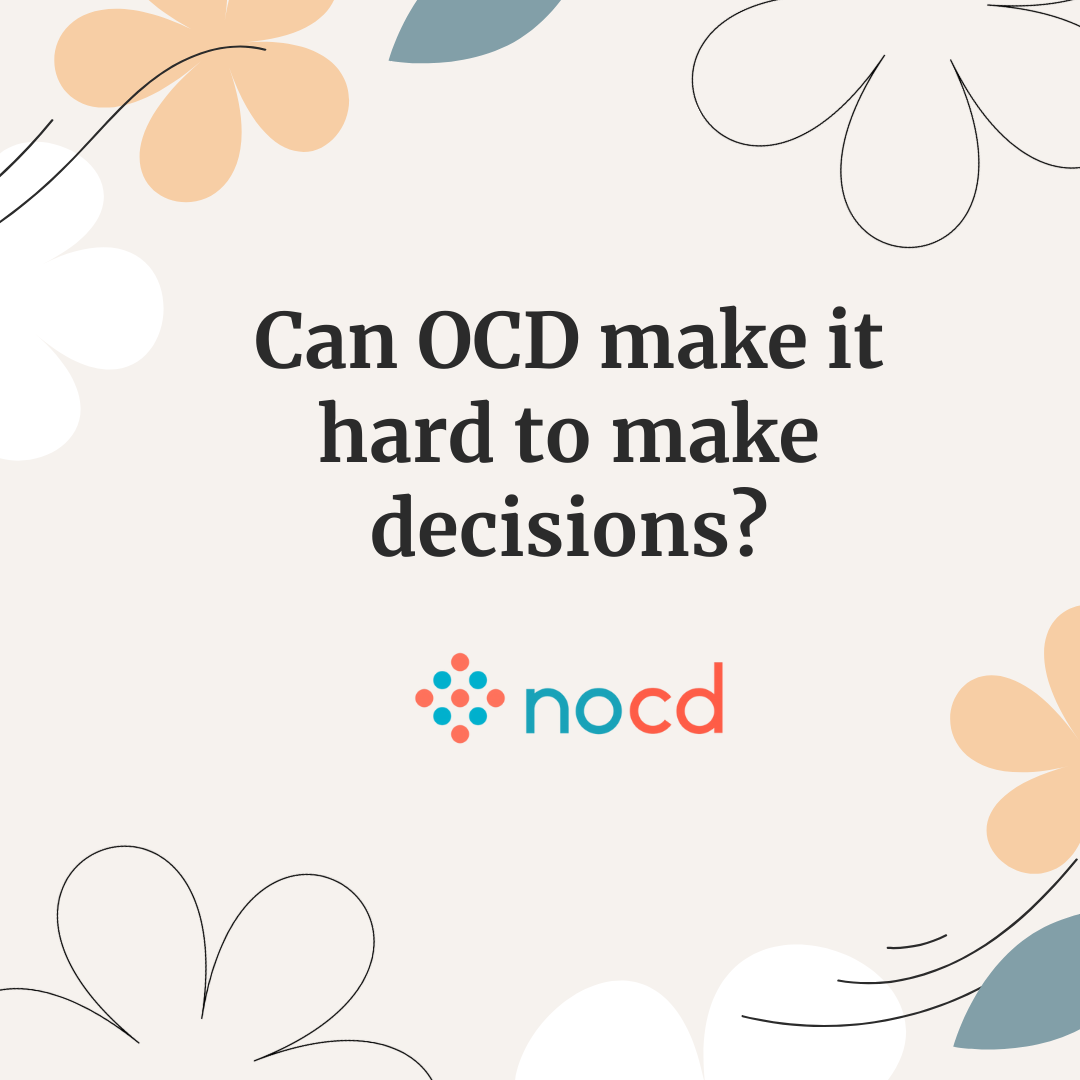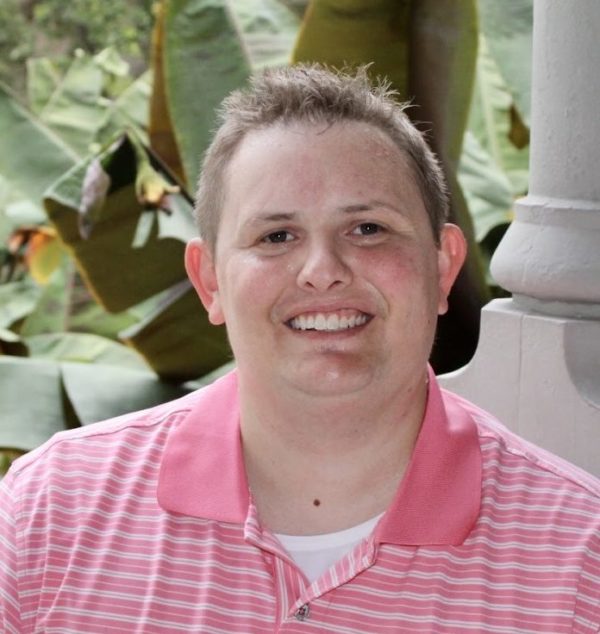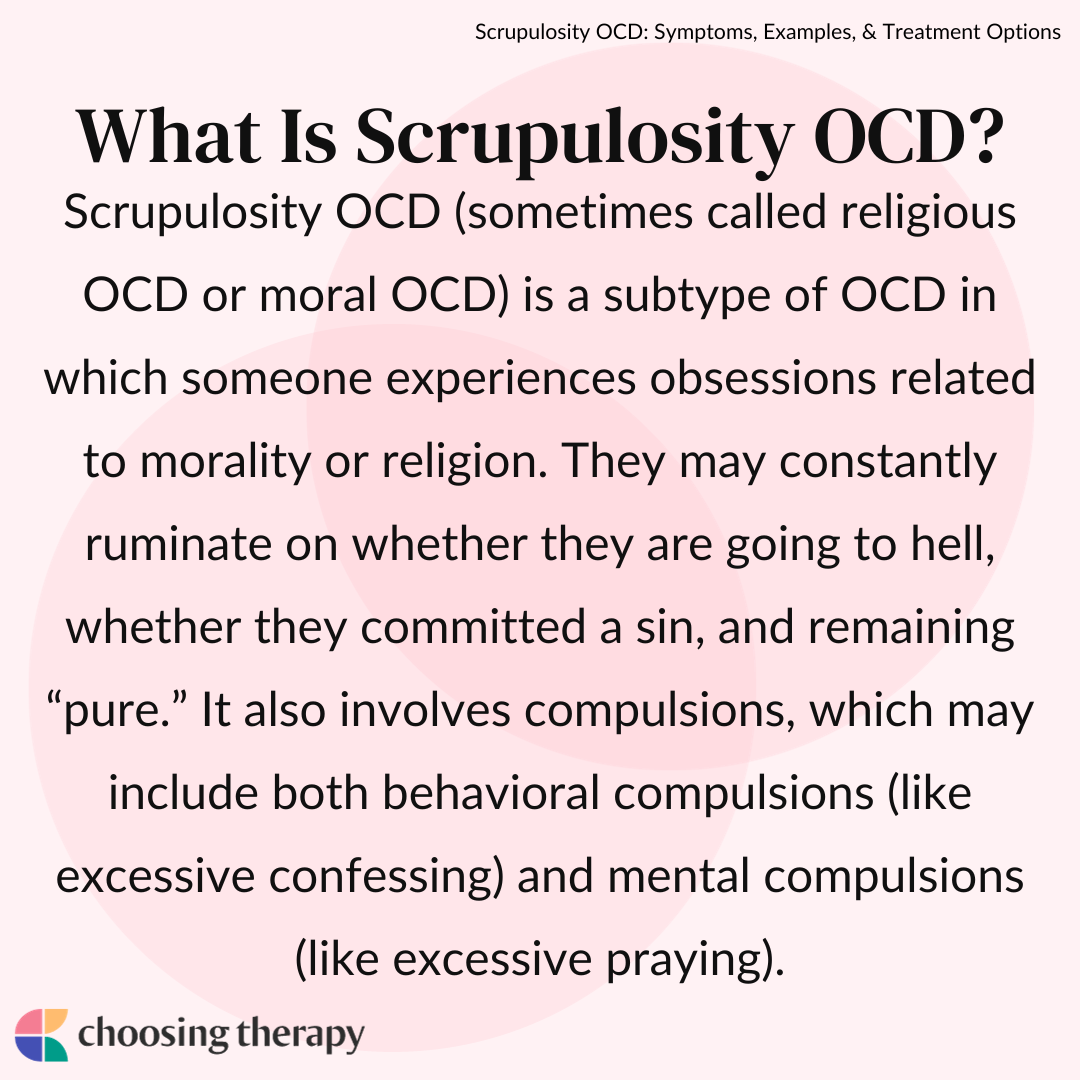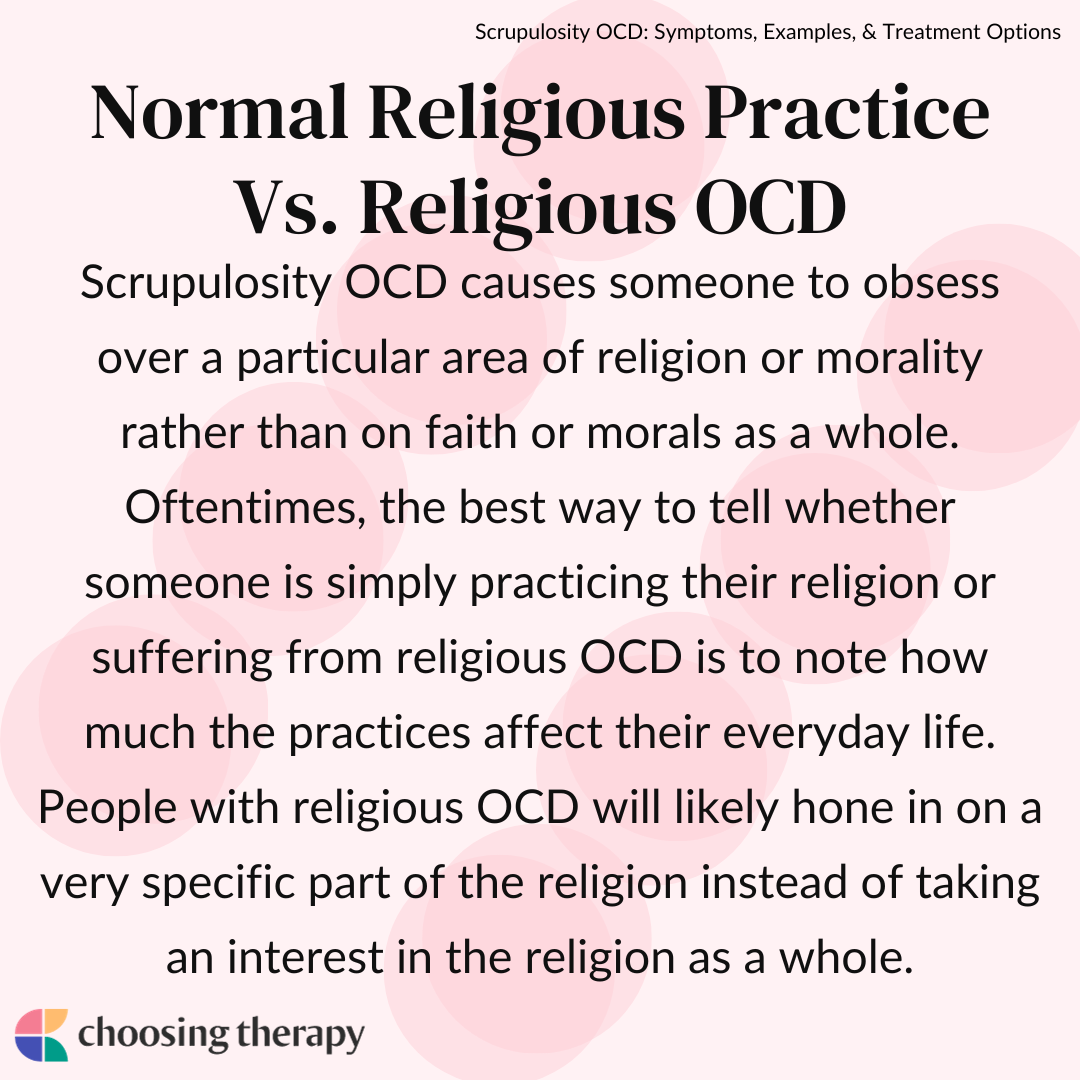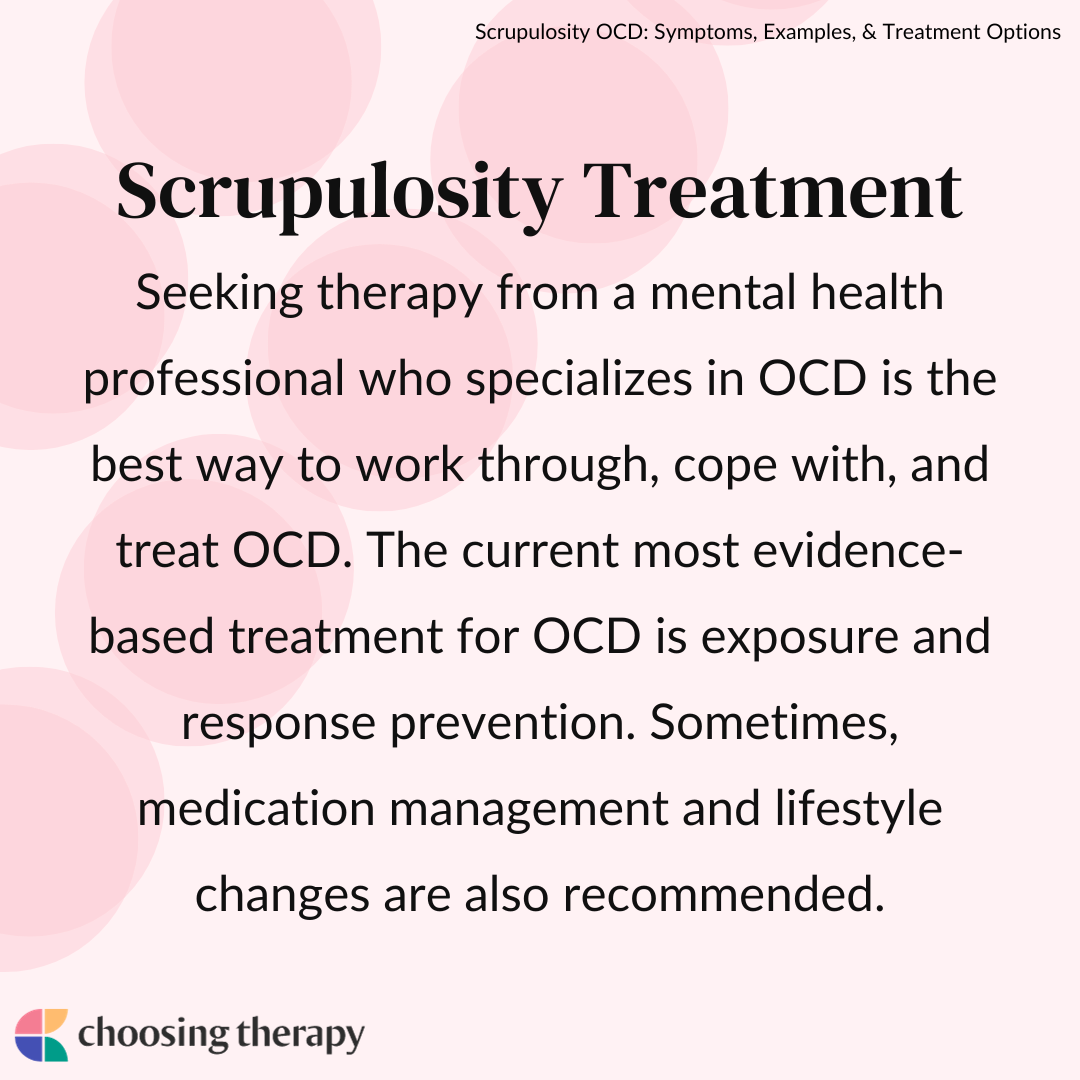Scrupulosity OCD involves experiencing religious or moral obsessions as well as intrusive, unwanted thoughts, images, or urges. People with scrupulosity OCD will often find themselves obsessing over whether their thoughts or actions may be immoral, unethical, or sinful.1 The most effective treatment for scrupulosity OCD is exposure and response prevention.
What is the best therapy for Scrupulosity OCD?
Exposure And Response Prevention Therapy (ERP) – Do live video sessions with a therapist specialized in ERP, the gold standard treatment for OCD. Treatment from NOCD is covered by many insurance plans. Start With A Free 15 Minute Call
What Is OCD?
Obsessive compulsive disorder (OCD) is a mental health disorder characterized by a cyclical nature of obsessions and compulsions. Obsessions are unwanted intrusive thoughts, images, or urges that cause significant distress for a person with OCD. This distress causes the person to feel compelled to perform compulsions, which are mental or behavioral acts that provide short-term relief from obsessions. In the long-term, however, these compulsions only reinforce the obsessions.
What Is Scrupulosity OCD?
Scrupulosity OCD (sometimes called religious OCD or moral OCD) is a subtype of OCD in which someone experiences obsessions related to morality or religion.2 They may constantly ruminate on whether they are going to hell, whether they committed a sin, and remaining “pure.”1 It also involves compulsions, which may include both behavioral compulsions (like excessive confessing) and mental compulsions (like excessive praying).2
Scrupulosity Examples
Scrupulosity OCD is centered around religious or moral obsessions. Compulsions may be performed to neutralize the distress around obsessions.
Here are some examples of what scrupulosity OCD could look like:
- Intrusive thoughts that you have offended God through past sins and feeling the need to confess these actions to faith leaders or other members of your spiritual community.
- Experiencing intrusive sexual thoughts about someone, which would be considered lustful in your religion. Compulsions might include extensive prayer focused on purifying thoughts.
- Worrying that you did not complete a religious ritual correctly and compulsively re-performing the ritual an excessive number of times until it feels “correct.”
Moral OCD Examples
Scrupulosity and moral OCD don’t always have to have a religious element. Here are some of examples of what non-religious, moral OCD may look like:
- Worrying you are not being completely honest with someone and needing to “confess” certain thoughts until you feel that you have been 100% honest
- Experiencing intrusive images of cheating on your partner and feeling the need to neutralize these thoughts through forced positive thoughts about your partner
- Fears that you are a “bad” person and mentally reviewing events in an effort to “prove” you are “good”
- Fears that thinking unkind thoughts about others makes you a “bad” person and seeking reassurance from others that they also occasionally have these types of thoughts
Treatment For OCD NOCD: Online OCD Treatment Covered By Insurance – Regain your life from OCD. Do live video sessions with a licensed therapist specialized in treating OCD. Treatment from NOCD is covered by most major insurance plans. Learn how you can use your insurance benefits. Visit NOCD Talkiatry: Is OCD Medication Right For You? Speak with A Doctor – Talkiatry can match you with a psychiatrist who takes your insurance and is accepting new patients. They’re in-network with major insurers and offer medication management with supportive therapy. Free Assessment
Scrupulosity & Religious OCD Symptoms
While many religious people worry or think about certain things related to their faith or belief system, they don’t obsess over these thoughts. People with scrupulous OCD symptoms take these worries to a point of obsession that begins to take over other aspects of their life. Scrupulosity OCD also involves compulsions in response to these obsessions; these could include excessive praying or asking for forgiveness, or avoiding their triggers.
Scrupulosity OCD Obsessions
Common obsessions associated with scrupulosity OCD include:3
- Angering God: Excessively worrying that they will say the wrong thing, think the wrong thing, or do the wrong thing and end up angering God.
- Going to Hell: Living in constant fear of going to hell for committing any sin or immoral act.
- Not practicing a religion perfectly: Whether it involves prayer or other religious activities, excessive worry over the perfection of religious practice is common in scrupulosity.
- Committing sins or acting immorally: Scrupulous OCD may lead to being afraid of committing a sin or immoral act, causing crippling fear and anxiety.
Scrupulosity OCD Compulsions
Common compulsions for people with scrupulosity OCD include:1,3
- Excessive praying: Praying for hours a day to counteract fear or as a response to “committing a sin.”
- Frequent confessions: Making frequent confessions due to fear of angering God, doing something wrong, or committing a sin.
- Avoiding situations that may lead to immoral or sinful acts: Avoiding any and all situations that could conceivably lead to committing a sin or an immoral act. Some may refuse to leave the house out of fear of committing sinful acts.
- Seeking reassurance from religious leaders: Continuously seeking reassurance from leaders of the religion to avoid imperfect religious practice.
- Repeated cleansing or purifying rituals: Due to fear of not being pure enough, people may participate in excessive cleansing or purifying rituals.
- Mentally repeating passages from scriptures: An excessive repeating of scriptures could be a way for someone with scrupulosity OCD to “counteract” having an impure thought or committing a sin.
- Excessive donations and altruistic practices: Obsessions around receiving existential punishments or simply fears of not being religious enough can cause someone to feel compelled to donate or volunteer to unhealthy levels. Although volunteering and donating are unselfish acts on the surface, a person with OCD would perform these as part of a behavioral ritual to avoid feared consequences.
- Self-punishment: Self-punishment can range from uncompassionate thoughts about oneself to actual behavioral self-harm acts. Scrupulosity OCD self-punishment might look like reviewing one’s sins and performing excessive penance or engaging in excessive prayer, confessing, or apologizing.
Moral OCD Obsessions & Compulsions
Not all scrupulosity obsessions and compulsions have to be religious in nature; instead, some people’s scrupulosity OCD obsessions will involve being moral and living “above reproach.”
Common moral obsessions include:
- Thinking that you are not doing well enough in life
- Worrying that you are accidentally hurting or causing harm to your family or community
- Thinking that you aren’t doing enough to help others
Potential moral compulsions could include:
- Asking for forgiveness from people in your life
- Excessively reading books about morality
- Engaging in charity work and doing helpful deeds to the point where it takes up a significant amount of time
How much do you know about OCD? Take This 11-Question OCD Quiz From NOCD. If you or a loved one are struggling with OCD, NOCD provides convenient, affordable, and effective OCD treatment covered by most major insurance plans.
Normal Religious Practice Vs. Religious OCD
Scrupulosity OCD causes someone to obsess over a particular area of religion or morality rather than on faith or morals as a whole. Oftentimes, the best way to tell whether someone is simply practicing their religion or suffering from religious OCD is to note how much the practices affect their everyday life. People with religious OCD will likely hone in on a very specific part of the religion instead of taking an interest in the religion as a whole.1
Here are several examples of scrupulosity OCD versus typical religious practices:
| Scrupulosity OCD | Normal Religious Practice |
| Praying an exact number of times and a specific prayer to avoid a feared consequence of existential punishment. | Praying before meals as a sign of thanks. |
| Contacting your religious leader multiple times a week to confess transgressions and ask for reassurance that you are not a “bad” person. | Confessing sins to a priest or pastor as a sign of penance. |
| Feeling compelled to volunteer at every event for fear that not performing a certain number of altruistic acts every month will lead to damnation. | Volunteering with your church or religious organization during holidays or special events. |
| Worrying that if you don’t tithe a certain amount, you might go to hell, or comparing your donations to other people in your religion and feeling you are not “doing enough.” | Tithing or donating a percentage of your paycheck to your religious organization on a weekly or monthly basis. |
| Posting scriptures or passages in every room of your home, work, and car for fears that not having the words present will cause harm to come to you. | Posting a scripture or passage in your room from a favorite religious teaching as motivation to live a more faithful life. |
| Committing a sin and feeling the need to repeat a prayer a certain number of times to “neutralize” the bad behavior. | Committing a sin and feeling a sense of embarrassment for stepping outside of your faith’s values. |
| Accidentally messing up a certain line of prayer and feeling compelled to repeat the line many times until it feels “just right” or “correct.” | Messing up a certain line of prayer and repeating the line once to correct your mistake. |
How Common Is Scrupulosity?
It is estimated that about 2% of the population will experience OCD symptoms, and within that group, a third (or 0.6% of the population) of those symptoms are related to scrupulosity.1 It is important to recognize that the culture we’re in can perpetuate such occurrences, and these numbers may be underreported.
Is Scrupulosity More Common Among People From a Specific Religion?
There is no evidence to suggest that one religion is more prone to influencing people into developing scrupulosity OCD. It is important that people who find support from their religions get supportive care when dealing with scrupulosity.1
What Causes Scrupulosity?
There is no specific cause of this type of OCD, however, causes for developing OCD can include:
- Environmental factors
- Genetic factors
- Values of family of origin
- Family trauma history
- Personal trauma history
Getting an OCD Diagnosis
A therapist, psychiatrist, or medical doctor can diagnose OCD. They will often ask you questions through the form of a clinical interview, focusing on the history, frequency, and intensity of your symptoms. Sometimes, it can be helpful for these providers to work together regarding your diagnosis. You can sign a release of information to have your treatment team speak with one another regarding your OCD symptoms and plans for treatment.
What is the best therapy for Scrupulosity OCD?
Exposure And Response Prevention Therapy (ERP) – Do live video sessions with a therapist specialized in ERP, the gold standard treatment for OCD. Treatment from NOCD is covered by many insurance plans. Start With A Free 15 Minute Call
Scrupulosity Treatment
Seeking therapy from a mental health professional who specializes in OCD is the best way to work through, cope with, and treat OCD. The current most evidence-based treatment for OCD is exposure and response prevention. Sometimes, medication management and lifestyle changes are also recommended.
Exposure & Response Prevention
Exposure and Response Prevention (ERP) is the gold standard treatment for OCD. It involves the patient exposing themselves to obsessive thoughts while preventing themselves from engaging in their compulsive behaviors or rituals.3
Examples of Exposures for Scrupulosity
During ERP, potential exposures that the therapist could have someone with scrupulosity OCD face might include:
- Reducing their time praying
- Limiting their time reading religious texts
- Avoiding conversations about morality
- Stopping compulsive behaviors from occurring
- Limiting visits to church to once or twice a week
Will an ERP Therapist Make Me Do Bad Things?
No, an ERP therapist will not make you do bad things. Instead, the therapist will show you how to allow more time and energy in your life for good things, like engaging in healthy relationships and increasing your life satisfaction.
Acceptance & Commitment Therapy
Acceptance and commitment therapy (ACT) is a CBT-based therapy with the goal of developing psychological flexibility. ACT is based on the notion that distress and pain are basic parts of life and it is the meaning attached to problems which causes the most distress. ACT for scrupulosity OCD teaches a person to accept the nature of obsessions, while learning to still pursue what is important to them. Therapy often involves exploring core values and life goals for leading a purpose-driven life.
Medication
In some cases of moral or religious scrupulosity, a psychiatrist may prescribe medication for OCD. The most common medications prescribed for people with OCD are selective serotonin reuptake inhibitors (SSRIS).4
How to Get Help for Scrupulosity OCD
It’s incredibly important to find a therapist who specializes in OCD, as evidence-based treatments are very specific. A therapist will guide treatment discussions after determining what may be causing the symptoms. Referrals can be obtained by calling your insurance provider or speaking with your primary care provider. You could also use an online OCD resource, like NOCD, to find specialized care.
How to Find a Therapist
To find a therapist, consider asking your primary care provider for a referral or using an online therapist directory. You could also go through your insurance provider. If you have one, call them or access their website to find a therapist who can help.
Are Faith Leaders Ever Involved in Scrupulosity OCD Treatment?
Faith leaders can play a helpful role in treatment when they understand and respect the role of your therapist. If you feel that your faith leader could provide important context and they are willing, you may even ask your therapist if a release of information could be signed to speak with them. Important boundaries need to be drawn around mental health strategies coming from evidence-based practices, but your faith leader may have important experience and spiritual advice rooted in your faith principles.
How to Overcome Scrupulosity OCD
While getting professional treatment is the most important step in overcoming scrupulosity OCD, it’s also important for you to recognize negative thought patterns that may be fueling your OCD.1 Noticing the patterns and describing them to your therapist can help you both come up with the most helpful treatment plan possible.
Negative thought patterns to watch out for include:1
- Thinking in extremes like, “I must not commit a single sin or I am going to hell.”
- Extreme sense of responsibility: you may find yourself worrying about upsetting God or the people around you by behaving incorrectly.
- A belief that your thoughts are able to be controlled.
Foss states, “Accept that you cannot be perfect, no matter what you do. The best we can be, both religious and morally, is good enough. And, good enough is OK. Attempt to recognize which thoughts are consistent with you and your genuine values, and which ones are obsessive, impossible, and well beyond reasonable. Once you do this, spend as little time as possible considering them, evaluating their merit, or wondering what role they have in your life. Any amount of time thinking about them will only reinforce their presence in your life and lead you further away from your desired goals and values. Just because you have the thought doesn’t mean you have to do it. Accept that those thoughts will show up sometimes, but that you are in control about what you do.
You don’t have to do bad or sinful things to get better, but you have to put yourself at the risk of doing bad or sinful things. In other words, the compulsive “safety” behaviors are an attempt to ensure that you are OK and that you will never do the wrong, immoral, or sinful thing. This is ultimately fruitless. Resisting the compulsion is not the same as doing a bad or sinful act, and resisting the compulsion put you in the same place as everyone else; at risk of doing something bad or sinful. Which again, is not the same as actively doing something bad and sinful.”
Examples of Therapy for Scrupulosity & Religious OCD
Scrupulosity OCD does not show up in the same way for everybody. The symptoms of OCD will show up depending on a number of factors, including personality, religion, morals, and whether or not OCD shows up as a moral or religious subtype.
Terrified of Sinning, Praying Constantly & Isolating
Wendy finds herself praying excessively throughout the day, crossing herself multiple times to ensure she has done it perfectly. She has stopped hanging out with friends out of fear that she will be tempted to sin. She is single because she fears that going on dates will lead to sinful thoughts or actions. She has begun to feel alone because her friends no longer reach out, knowing she will turn them down.
When Wendy finally decides to seek help, her treatment involves exposure and response prevention (ERP). Her therapist talks to her about what she was afraid of, why she felt that she needed to cross herself perfectly, and why she feared going out with her friends. Slowly, Wendy finds herself able to resist her impulse to pray and worry. She slowly starts reaching out to friends again and getting out of the house. Wendy has a date this Friday. While she is not completely cured yet, she is on the right path to healing.
Compulsive Hand Washing
Ned believes it is morally wrong to touch things that other people may touch with dirty hands. Because of this belief, Ned washes his hands to the point that they are extremely cracked and dry. Ned’s productivity at work is impacted by his compulsions and he is on the brink of losing his job. He finally decides to seek help from his therapist, who assigns him exposure and response prevention (ERP) therapy. Ned’s therapist exposes Ned to his fear of touching things with unwashed hands slowly and teaches Ned methods to avoid his compulsion. Ned finds, over time, that his compulsion to wash his hands before touching things is beginning to fade.
Terrified of Breaking Rules, Stops Leaving the House
Sam finds herself terrified of committing any act that may involve breaking the rules or getting into trouble. She becomes so terrified of getting into trouble that she stops leaving her house altogether out of fear. Her friends and family are becoming concerned and suggest that she seek help. Her therapist suggests CBT. As Sam talks through her reasoning behind her OCD, her therapist presents methods to manage it. She begins to see positive results the more she practices her methods.
To help our readers take the next step in their mental health journey, Choosing Therapy has partnered with leaders in mental health and wellness. Choosing Therapy is compensated for marketing by the companies included below. OCD Therapy NOCD: Effective, Affordable, & Convenient OCD Therapy Do live, face-to-face video sessions with a therapist who specializes in treating OCD and get 24/7 support between sessions. NOCD is covered by many insurance plans and is available nationwide. Visit NOCD Treatment From An Online Psychiatrist Talkiatry OCD is treatable. Talkiatry specializes in OCD and provides personalized care with medication and additional support. Get started with a short assessment. OCD Newsletter A free newsletter from Choosing Therapy for those impacted by OCD. Get helpful tips and the latest information. Sign-UpAdditional Resources
In My Experience
What to know when finding a therapist for OCD With so much information out there regarding providers and treatment options for obsessive compulsive disorder, it can be hard to know exactly where to start—especially when you have to consider everything from the type of provider to the different treatment methods, as well as how you’ll fit it into your busy schedule. Can OCD make it hard to make decisions? From choosing what to wear in the morning to picking what to eat for dinner, decision-making is a part of everyone’s daily routine. But for millions of people with Obsessive-Compulsive Disorder (OCD), making any choice can feel like a daunting, sometimes impossible task.